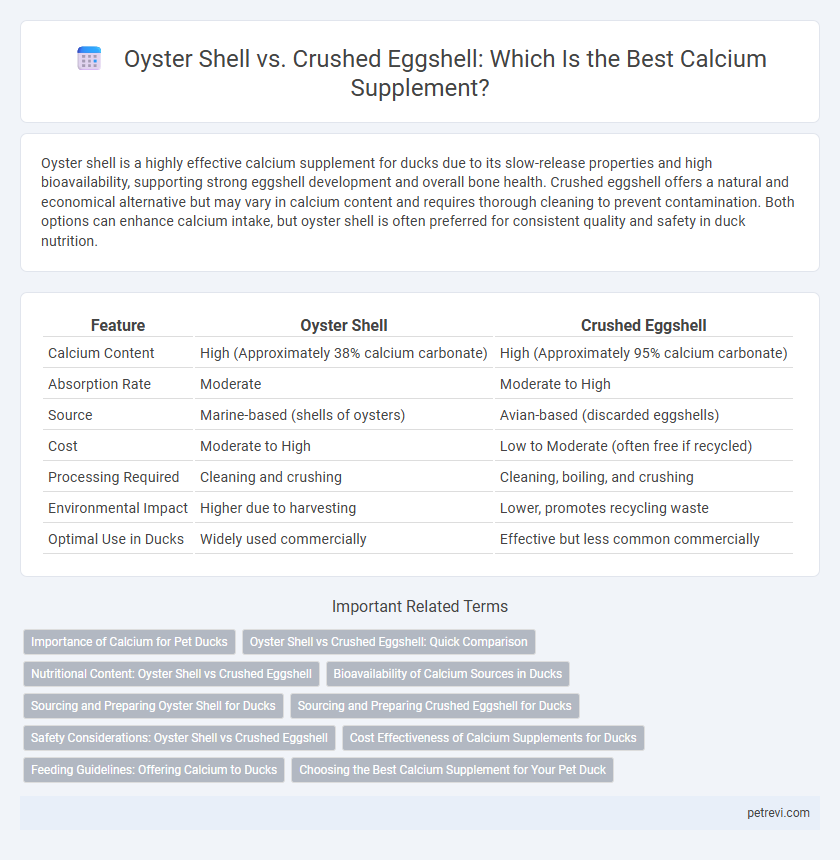Oyster shell is a highly effective calcium supplement for ducks due to its slow-release properties and high bioavailability, supporting strong eggshell development and overall bone health. Crushed eggshell offers a natural and economical alternative but may vary in calcium content and requires thorough cleaning to prevent contamination. Both options can enhance calcium intake, but oyster shell is often preferred for consistent quality and safety in duck nutrition.
Table of Comparison
| Feature | Oyster Shell | Crushed Eggshell |
|---|---|---|
| Calcium Content | High (Approximately 38% calcium carbonate) | High (Approximately 95% calcium carbonate) |
| Absorption Rate | Moderate | Moderate to High |
| Source | Marine-based (shells of oysters) | Avian-based (discarded eggshells) |
| Cost | Moderate to High | Low to Moderate (often free if recycled) |
| Processing Required | Cleaning and crushing | Cleaning, boiling, and crushing |
| Environmental Impact | Higher due to harvesting | Lower, promotes recycling waste |
| Optimal Use in Ducks | Widely used commercially | Effective but less common commercially |
Importance of Calcium for Pet Ducks
Calcium supplementation is essential for pet ducks to support strong bone development and healthy eggshell formation, with oyster shell and crushed eggshell serving as common dietary sources. Oyster shell is rich in bioavailable calcium carbonate, making it highly effective for maintaining calcium balance and preventing metabolic bone disease in ducks. Crushed eggshells provide a natural and sustainable calcium source but may vary in calcium content and require thorough cleaning to avoid contamination risks.
Oyster Shell vs Crushed Eggshell: Quick Comparison
Oyster shell offers a highly bioavailable source of calcium with slow release, supporting long-term bone health in ducks, while crushed eggshell provides a cost-effective, recycled calcium option but with more variable calcium content. Oyster shell is typically richer in calcium carbonate, ensuring consistent supplementation, whereas eggshell calcium may require proper cleaning and processing to ensure safety. Both forms can enhance calcium intake, but oyster shell is preferred for precision and reliability in duck nutrition.
Nutritional Content: Oyster Shell vs Crushed Eggshell
Oyster shell and crushed eggshell both provide essential calcium for ducks, but oyster shells typically contain around 38-40% calcium carbonate, offering a purer and more digestible form. Crushed eggshells, composed of approximately 95% calcium carbonate, also supply calcium but may contain organic residues affecting absorption. Choosing oyster shell supplements ensures a consistent calcium supply crucial for eggshell formation and bone health in ducks.
Bioavailability of Calcium Sources in Ducks
Oyster shell provides a highly bioavailable form of calcium essential for duck eggshell formation and bone health, characterized by its slow dissolution rate that ensures steady calcium release. Crushed eggshells, while similar in calcium carbonate content, exhibit variable bioavailability due to differences in particle size and potential contamination risks. Studies indicate that oyster shell supplementation results in improved calcium absorption and utilization in ducks compared to crushed eggshells, supporting optimal productivity and skeletal strength.
Sourcing and Preparing Oyster Shell for Ducks
Oyster shell, sourced from clean, sustainably harvested oyster beds, provides a highly bioavailable calcium source essential for ducks' bone health and egg production. Before feeding, oyster shells must be thoroughly washed, dried, and crushed into fine particles to enhance digestibility and absorption. Proper preparation minimizes contaminants and pathogens, ensuring a safe and effective supplement compared to crushed eggshells, which may vary in calcium content and digestibility.
Sourcing and Preparing Crushed Eggshell for Ducks
Crushed eggshells provide an effective, natural source of calcium for ducks, often preferred over oyster shells due to ease of sourcing and sustainability. To prepare crushed eggshells, thoroughly clean and bake them at 200degF for 10 minutes to eliminate pathogens before grinding into a fine powder. This process ensures a safe, bioavailable calcium supplement that supports eggshell strength and overall duck health.
Safety Considerations: Oyster Shell vs Crushed Eggshell
Oyster shell and crushed eggshell both provide high levels of calcium essential for ducks, but safety considerations differ significantly. Oyster shell is generally more consistent in calcium content and free from pathogens, reducing the risk of contamination, while crushed eggshell may harbor bacteria if not properly sanitized before supplementation. Careful preparation and sourcing are critical when using eggshells to ensure safe calcium supplementation without introducing harmful microorganisms to the duck's diet.
Cost Effectiveness of Calcium Supplements for Ducks
Oyster shells provide a highly bioavailable source of calcium for ducks at a moderate price, making them a popular choice among poultry keepers. Crushed eggshells, often sourced from kitchen waste, offer a nearly cost-free alternative that still delivers essential calcium, though variability in particle size can affect absorption. Comparing cost effectiveness, crushed eggshells outperform commercial oyster shells in affordability, especially for small-scale duck owners aiming to minimize feed supplementation expenses.
Feeding Guidelines: Offering Calcium to Ducks
Oyster shell and crushed eggshell both serve as effective calcium supplements for ducks, with oyster shell providing a more uniform source of calcium carbonate. Offer calcium supplements separately from regular feed, allowing ducks free access to ensure they consume adequate nutrients for eggshell formation and bone health. Provide about 1-2 teaspoons per duck daily, adjusting based on age, health, and egg production levels.
Choosing the Best Calcium Supplement for Your Pet Duck
Oyster shell provides a highly bioavailable source of calcium ideal for strengthening a pet duck's eggshells and bones, while crushed eggshell offers a natural, readily digestible alternative rich in calcium carbonate. When choosing the best calcium supplement for your pet duck, consider the purity, particle size, and calcium content; oyster shell typically contains around 38% calcium, whereas crushed eggshell may vary depending on preparation. Ensuring consistent calcium intake supports proper shell formation during egg-laying and maintains overall skeletal health in ducks.
Oyster Shell vs Crushed Eggshell for Calcium Supplementation Infographic

 petrevi.com
petrevi.com